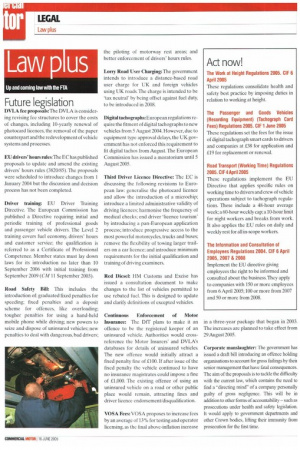Future legislation
Page 44

If you've noticed an error in this article please click here to report it so we can fix it.
DVLA fee proposals: The DVLA is considering revising fee structures to cover the costs of changes, including 10-yearly renewal of photocard licences, the removal of the paper counterpart and the redevelopment of vehicle systems and processes.
EU drivers' hours rules:The EC has published proposals to update and amend the existing drivers' hours rules (3820/85). The proposals were scheduled to introduce changes from 1 January 2004 but the discussion and decision process has not been completed.
Driver training: EU Driver Training Directive. The European Commission has published a Directive requiring initial and periodic training of professional goods and passenger vehicle drivers. The Level 2 training covers fuel economy, drivers' hours and customer service; the qualification is referred to as a Certificate of Professional Competence. Member states must lay down laws for its introduction no later than 10 September 2006 with initial training from September 2009 (CM 11 September 2003).
Road Safety Bill: This includes the introduction of: graduated fixed penalties for speeding; fixed penalties and a deposit scheme for offences, like overloading; tougher penalties for using a hand-held mobile phone while driving; new powers to seize and dispose of uninsured vehicles: new penalties to deal with dangerous, bad drivers; the piloting of motorway rest areas; and better enforcement of drivers' hours rules.
Lorry Road User Charging: The government intends to introduce a distance-based road user charge for UK and foreign vehicles using UK roads. The charge is intended to be `tax neutral' by being offset against fuel duty, to be introduced in 2008.
Digital tachographs: European regulations require the fitment of digital tachographs to new vehicles from 5 August 2004. However, due to equipment type approval delays, the UK government has not enforced this requirement to fit digital tachos from August. The European Commission has issued a moratorium until 5 August 2005.
Third Driver Licence Directive: The EC is discussing the following revisions to European law: generalise the photocard licence and allow the introduction of a microchip; introduce a limited administrative validity of driving licences; harmonise the frequency of medical checks; end driver 'licence tourism' by introducing a pan-European application process; introduce progressive access to the most powerful motorcycles, trucks and buses; remove the flexibility of towing larger trailers on a car licence; and introduce minimum requirements for the initial qualification and training of driving examiners.
Red Diesel: HM Customs and Excise has issued a consultation document to make changes to the list of vehicles permitted to use rebated fuel. This is designed to update and clarify definitions of excepted vehicles.
Continuous Enforcement of Motor Insurance: The DfT plans to make it an offence to be the registered keeper of an uninsured vehicle. Authorities would crossreference the Motor Insurers' and DVLA's databases for details of uninsured vehicles. The new offence would initially attract a fixed penalty fine of £100. If after issue of the fixed penalty the vehicle continued to have no insurance magistrates could impose a fine of £1,000. The existing offence of using an uninsured vehicle on a road or other public place would remain, attracting fines and driver licence endorsement/disqualification.
VOSA Fees: VOS A proposes to increase fees by an average of 13% for testing and operator licensing, as the final above-inflation increase in a three-year package that began in 2003. The increases are planned to take effect from 29 August 2005.
Corporate manslaughter: The government has issued a draft bill introducing an offence holding organisations to account for gross failings by then senior management that have fatal consequences. The aim of the proposals is to tackle the difficulty with the current law, which contains the need to find a "directing mind" of a company personally guilty of gross negligence. This will be in addition to other forms of accountability — such as prosecutions under health and safety legislation. It would apply to government departments and other Crown bodies, lifting their immunity from prosecution for the first time.








































































































































































































